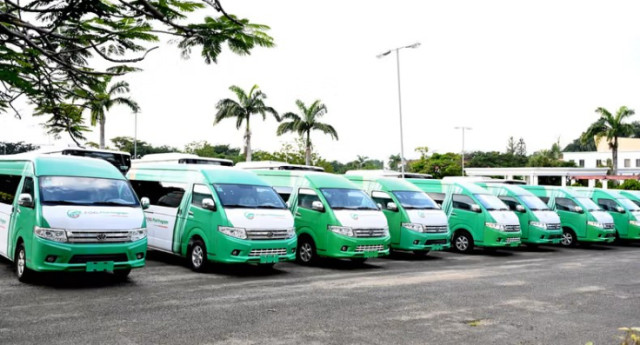The Federal Government has given out 64 Compressed Natural Gas-powered buses to the Organised Labour unions and the National Association of Nigerian Students at the Aso Rock Villa, Abuja.
The 100-capacity buses are part of the Presidential CNG initiative’s pilot programme, to aid movement across the state.
The gesture will be done across the states and campuses according to the Minister of Information, Mohammed Idris, describing it as a “necessary first step.”
Idris said 40 buses would go to the labour unions, 20 to the student unions and four will transport passengers within Abuja.
This move became necessary after President Bola Tinubu launched 30 hybrid-powered CNG buses donated by the Depots and Petroleum Products Marketers Association of Nigeria at the State House in Abuja.
It also comes about 48 hours before the country’s 64th Independence Day anniversary on October 1, 2024, as Nigerians plan to protest the harsh living conditions nationwide.
Recall that there has been a back-and-forth negotiations between the FG and the organised labour since last October which had threatened to begin a nationwide strike.
As of October last year, the government agreed to vote N100bn to provide high-capacity CNG buses for mass transit in Nigeria, then Labour Minister, Simon Lalong, revealed.
Lalong said plans were underway for an initial 55,000 CNG conversion kits to kick-start an autogas conversion programme, while work was ongoing on state-of-the-art CNG stations nationwide.
“The rollout aims to commence by November with pilots across 10 campuses nationwide,” he noted.
However, the programme had suffered delays as Nigerians continued to stagger under the mounting cost of transportation and soaring petrol pump prices.
The FG said the vehicles were unavailable for direct purchase and were only being manufactured upon order.
In April 2024, the Presidency announced it would release about 2,700 CNG-powered buses and tricycles before the end of 2024. This includes 600 buses, 2,500 tricycles, 100 conversion workshops, and 60 refuelling sites across 18 states.
The Minister of Information and National Orientation, Mohammed Idris, told journalists that, “This is a necessary first step that the government has taken, and we are giving out 64 buses to commemorate the 64th independence anniversary of our great country.
“Forty of these buses are going to the labour unions. You heard the representative of the labour here accepting them. Twenty of the buses are going to the students union, and about four will now be here in the Federal Capital Territory.
“Now, let me emphasise that this is not all. Over 700 of these buses have already been ordered. These are the first sets we are giving out to symbolise the official commencement of this initiative of Mr. President. So don’t say that you only have 64 buses to cater to the whole of this country. It’s a necessary first step by government.”
“It’s a promise that Mr President has kept to Nigerians, and we know that very soon, more of these buses will ply all the roads of this country.
“This signifies a major step in the fight against inflation. We’ve had an initial spike in inflation. Now, it has peaked, and it is coming down. Mr President and the whole team are determined to ensure we keep inflation coming down. This is one of the major ways CNG-fuelled transportation.
“CNG-fuelled vehicles cost one-third of the PMS of a petrol-fuelled vehicle. So, instead of paying N50,000 to fill a tank, you’ll be paying N15,000. That’s a huge contribution towards fighting inflation and giving us lower costs.
“This also marks another important element of the President’s policies. It is transitioning to cleaner fuel, but most importantly, cheaper fuel for Nigerians. The emphasis is on mass transit, to intervene on the side of workers so that they have cheaper transport that helps them cope with the increased price level generally, which was an inevitable fallout of improving the economy.”
The Secretary-General of the Trade Union Congress, Nigeria, Mr. Nuhu Toro, expressed gratitude for the CNG buses but noted that the number provided was not fully proportional to the needs of the workforce.
Toro said, “This step forward brings us closer to a future where workers and the planet benefit from such forward-thinking policies, which is commendable."




















